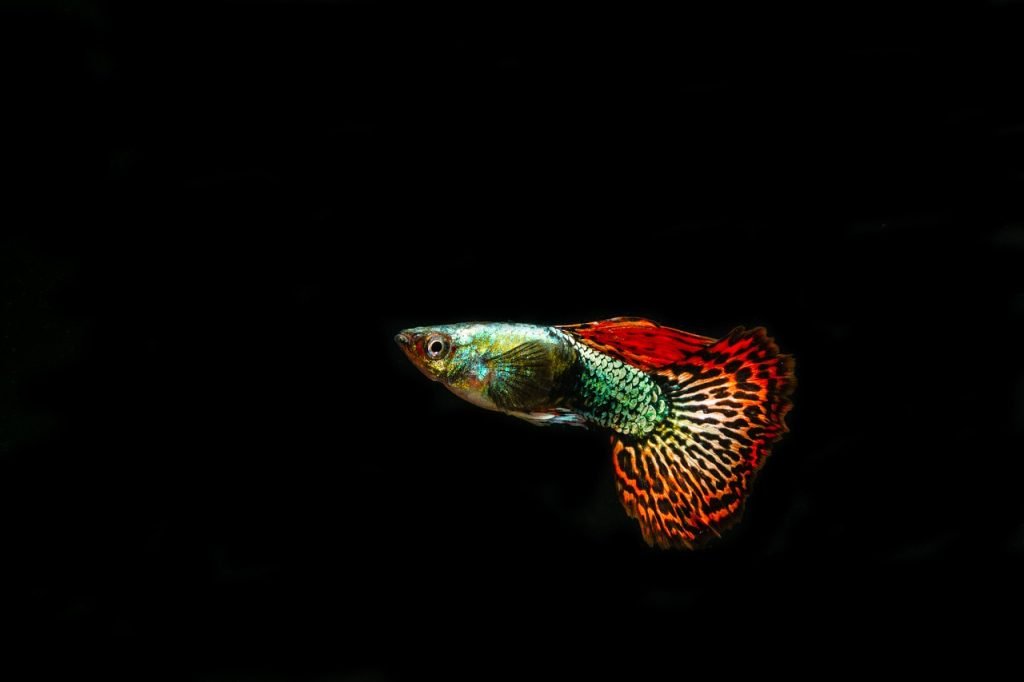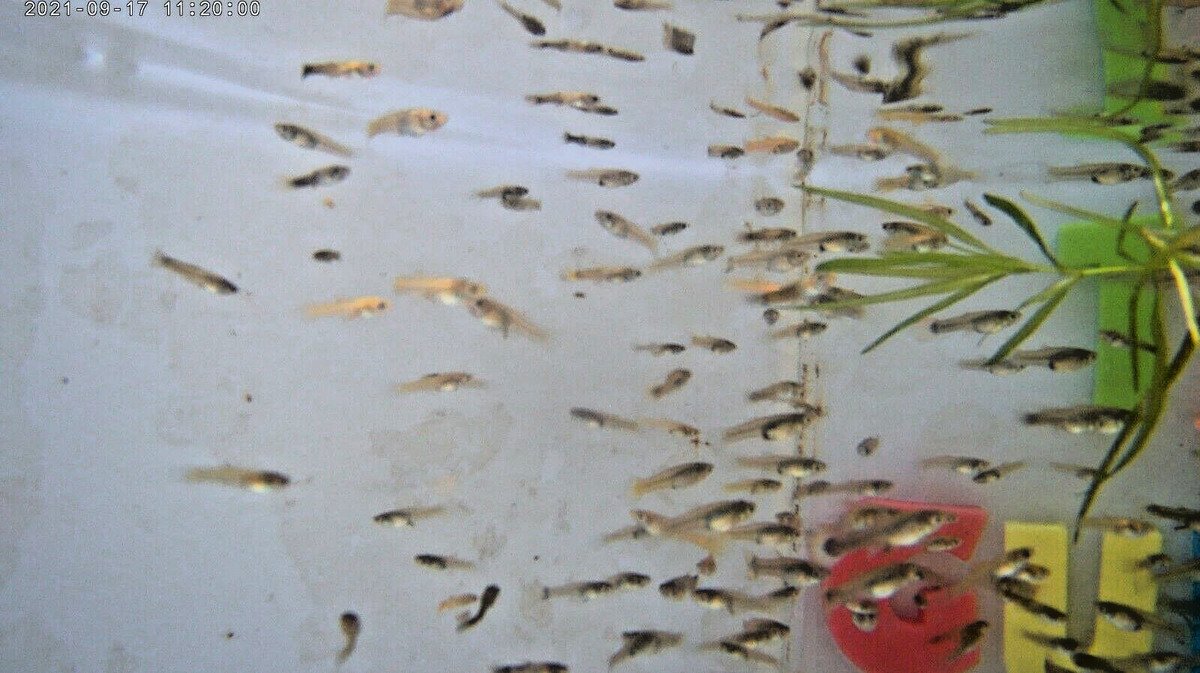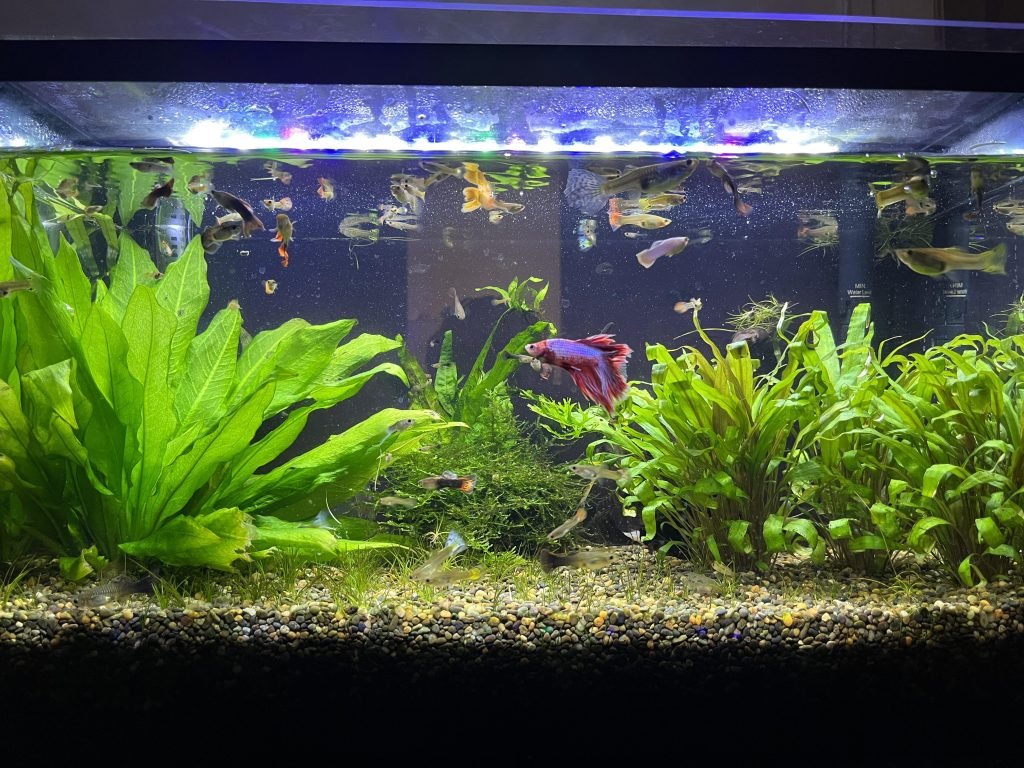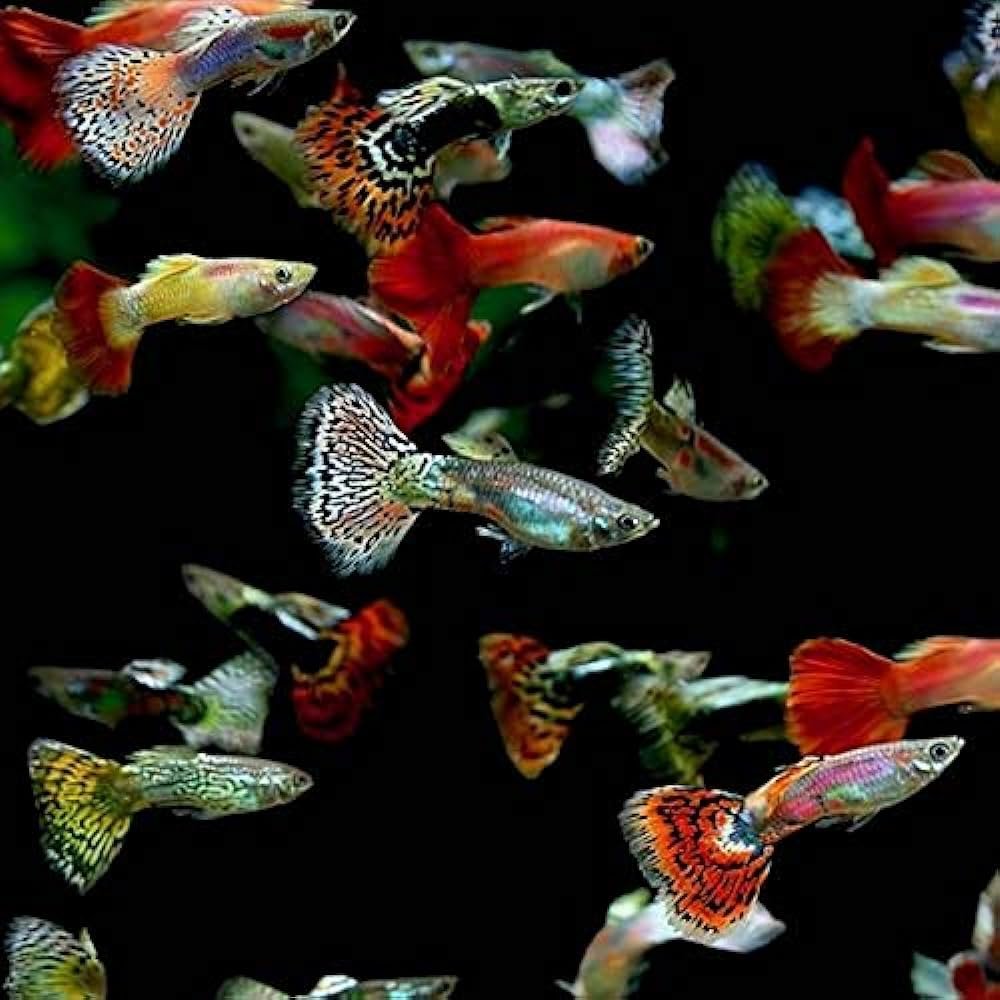How long do guppies live
How long guppies live depends on multiple factors, but on average, the lifespan of guppies ranges from 2 to 3 years.
With that said- I’ve seen guppies go for much longer, with some inching the 5-year mark.
So what can you do to make your guppies live longer?
The 5 factors that will dictate how long guppies live are :
- Genetics
- Tank conditions
- Tank size
- Social interaction
- Nutrition
How Long Do Guppies Live In The Wild?
Guppies live about 2 years in the wild
How Long Do Guppies Live In A Tank?
Guppies live up to 5 years in a tank, but the average is about 2-3 years.
In the wild, female guppies tend to live longer than male guppies even though they can give birth to up to 2000 baby fry throughout their lifetime. With that said, in captivity they tend to live just as long as male guppies.
On the flip side, though, both male and female guppies live longer in captivity than they would otherwise do in the wild.
But that’s enough theory for one day.
Let’s dive into what will make your guppies live the longest.
Table of Contents
The 5 Things That Affect How Long Guppies Live?
1) Genetics
Guppies, just like other uber-cool animals like eagles or unicorns, inherit certain traits from their parents.
That includes their genetic predisposition to longevity- i.e. how prone they are to disease.
Some guppies will be in it for the long ride, while others will be the fish version of 3 and out.
But unless you’ve got a super accurate crystal ball or a fishery degree from Hogwarts- you won’t really know the guppies’ genetic makeup when you buy them at the store.
So what is the one thing you can do to tell how long your guppies will live?
That would be to buy them from a reputable seller.
(BTW, if you do have an accurate crystal ball or an accredited degree from Hogwarts, then don’t bother reading the rest of this article. Your guess IS better.)

Guaranteeing Your Guppies
See, here in 2023 we’ve got this magical mechanism that solves all of our problems:
Online reviews.
It allows us to vent to the world when our burger is late, and tell anyone about the good service we received from an online fish seller.
Aside from fake reviews, of course, it’s virtually fool-proof.
So how do you choose an online seller?
Look for the following details:
Alive on arrival guarantee.
There is a common practice in the industry that guarantees fish will be live on arrival.
That means that if any fish didn’t survive transport while they were shipped to you the seller will either refund you or give you a credit.
Overnight shipping
Shipping is extremely stressful on guppies, and stress skills them like no other.
That means that the faster the shipping, the better it is for the fish. And I’m not even mentioning how long can guppies live without food.
The really good sellers will also have a pretty strict shipping schedule. They may only ship Monday-Thursday to minimize delayed transit.

2) Environment and Care
Creating a suitable and well-maintained environment is crucial for the longevity of guppies. Here are some key factors to consider
Water Care
Maintain stable water conditions within the ideal range for guppies. This includes a temperature around 78-82°F (25-28°C), a pH level between 6.8-7.8. Keep the water temperature stable, meaning don’t allow it to fluctuate by more than one degree every 24 hours.
Test & Monitor
Use a test kit to ensure the water levels remain in optimal condition.
With temp and pH figured out, keep ammonia and nitrate levels at zero ppm, While your nitrate levels can go as high as 20 ppm.
Frequent Care
The last leg is to
Usually you would change anywhere from 20 to 50% of the water in tank about once a week. If you are using a seasoned filter with your pump then you might be able to cut down on the frequency or the amount of water changed.
3) Tank Size and Filtration
The size of the tank will also play a big role in how long your guppies live.
Guppies are pretty hyper, so they need space for swimming.
How much space?
About a gallon and a half per fish.
In a 10-gallon tank, you’ll be able to accommodate about 5 to 7 guppies, assuming we’re following the good ole’ one inch of fish per gallon .(guppies are about 1.5- 2 long)

Filtration
You’ll also need to make sure that the filtration system that you’re using in the tank is sized accordingly.
The filtration system needs to be able to move the entire tank content at least 6 times per hour.
Simple math will tell us that a 10-gallon tank should have at least a 60-gallon per hour water pump.
While there are many different types and shapes of aquarium filters, just make sure yours has a biofilter function.
Biofiltration will help you cut down on naturally occurring toxins in the water.
That filter will, over time, get seasoned with beneficial bacteria and will also cut down on the amount and frequency of water changes.
4) Nutrition
To make sure your guppies live as long as they possibly could you need to feed them a diverse diet of protein and vegetables.
Don’t feed them goldfish food– It is best to feed them fish food designed specifically for tropical fish.
You can give your guppies treats by preparing some life foods for them, in the form of brine shrimp, daphnia, vinegar eels, and so forth.
Brine shrimp are the easiest to prepare, produce the least amount of smell, and you’re able to freeze them in ice cubes and serve them at a later date.
Besides that, your guppies will munch on the plants that you have in your tank which will also give them some of the nutrients that they need.
Feed your bad boys (and girls) in small portions 2-3 times a day, And only give them enough food that they can eat in about a minute or two.
5) Social Interaction
Guppies are social fish and thrive in the company of their own species.
You may be shocked to learn that guppies are not schooling fish, but they still need to live in the company of each other to help reduce stress and live a longer life.

Keep them in groups of at least four to six individuals, And keep at least two to three females for every male that you have in the tank.
That will help reduce competition between males for female attention- which will also help them live longer.
And lastly, avoid overcrowding the tank.
Overcrowding can lead to increased competition for resources and potential health issues.
When we mentioned the one-inch per gallon rule It also applies to tankmates.
If you plan on having additional fish in the aquarium, like Tetras or cherry shrimp then you need to account for those in your calculations for a tank size.
Disease Prevention
As long as you maintain the tank about once a week you should be good.
Your biofilter will fight along your side, And in about six weeks after you’ve started your tank you should reach nirvana and maintain the tank only from time to time.
With that being said you still need to clean the bottom of the tank with a siphon pump when you do your water changes.
If you want to avoid parasite infestations in your tank make sure to quarantine new fish.
It also goes without saying don’t introduce new objects, whether decoration, fish, snails, etc., that you found in the outside world before quarantining it.
It’s also not a terrible idea to only buy fish, plants, and decorations that will go in your tank from reputable sources; like established online sellers or pet stores.
Make sure to monitor the overall health of your guppies, looking for any signs of illness, and promptly address any health issues that arise.
Are Your Guppies Stressed?
Watch for those 10 signs to maximize how long your guppies live
Changes in Color
Stressed guppies may exhibit pale or faded colors, especially in their fins and body. Some may even show dark or stressed-out patterns.
Reduced Appetite
A stressed guppy might lose interest in food or eat less than usual. This could lead to weight loss and a decrease in overall health.
Fins Clamped
Stressed guppies may clamp their fins tightly against their bodies as if trying to make themselves smaller and less noticeable.
Hiding Behavior
Stressed guppies may seek hiding spots in the aquarium, such as behind decorations or plants, to feel safe and secure.
Gasping at the Surface
If the water quality is poor or there is inadequate oxygen in the tank, guppies may gasp at the water surface for air.
Aggressive Behavior
Stress can cause some guppies to become more aggressive towards tank mates or even towards themselves, nipping at their own fins.
Flicking or Flashing
Guppies under stress might flick their bodies or flash their fins against objects in the tank, attempting to alleviate discomfort.
Erratic Swimming
Stressed guppies may swim frantically. There can be many reasons why it swims frantically- but non of them is good. darting around the tank without any apparent direction. Alternatively, they might become lethargic and stay at the bottom of the tank.
Reduced Reproduction
In heavily stressed environments, female guppies might delay or halt their breeding activities.
Excessive Jumping
In extreme cases of stress, guppies might jump out of the tank in an attempt to escape unfavorable conditions.
Conclusion
Guppies will live about 2-3 years in your tank.
With that said, you’ll probably never have to buy the fish more than once because they breed extremely fast.
How long your guppy lives will depend on their family tree- something you have no control over.
By maintaining a balanced tank and looking out for common diseases you’ll be able to give your guppies the longest lives they could possibly live.
